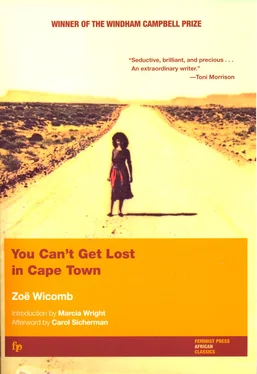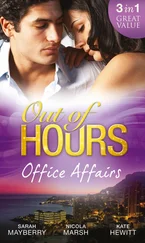I am pleased to see James and tidy away my folder to make room for him. But he collects a cup of coffee, drops his bag at my table and with a dismissive hallo goes straight to the back where he joins the boys. Unusual for him but it really does not matter. I stretch my legs and with my heels draw in James’s bag to support my calves. Perhaps I should take my folder out again and try to work, but there is no point; the others will be here soon. Instead I decide on another cup of coffee. It is not an extravagance; I shall not have one this afternoon. With my ten-cent piece I tap on the stainless-steel counter until I realise that the sound is not drowned by the rowdy klawerjas players. No one has whistled. Have I in spite of my narrowing waistline become one of those who does not merit a second look?
When Moira enters she stands for a moment framed in the doorway, blinking, for the sun has come out again. It is one of those just-spring days when the sun plays crazy kiss-catch games and the day revolves through all the seasons of the year. So Moira blinks in this darkness after the glare outside. The silence of her entry is unnerving. Moira has never moved in this room without a fanfare of whistles and an urgent drumming on the tables. She hesitates as if that exhalation of hot air is the only source of kinetic energy that will produce motion in her exquisite legs. Moira is indisputably beautiful. The smooth skin. The delicately sculpted form. The sleek brown hair.
But now her eyes are troubled, her hovering form uncertain, so that I wave at her and lo, the legs swing into mobility, the left foot falls securely on the floor and she propels herself expertly towards me. ‘Coffee or tea,’ I whisper loudly and point at the table where my folder lies. Like an automaton she changes direction and manoeuvres into a chair.
‘What’s going on in here? Where’s James?’ she asks.
James always sits with us. We have learned to make allowances for the filtered version of friendship that boys offer; nevertheless his behaviour today is certainly treacherous. Why has he gone without explanation to join the dark tower of boys peering down on to the table at the back? It is clearly not the klawerjas game that holds their attention. Someone screened from our vision is talking quietly, then bangs a fist on the table. The voices grow more urgent. We watch James withdraw from the inner circle and perch on the back of a chair shaking his head, but he does not look across at us.
By now the cafeteria is full. There is a long queue for coffee. The boys drift instinctively to the back to join the dark bank of murmuring males while the girls settle with their coffees at separate tables. Moira is agitated. What can they be talking about? We listen carefully but the sounds remain unintelligible. The group is no longer cohesive. It is too large, so that sub-groups mutter in cacophony, someone laughs derisively and above the noise the sound of Mr Johnson’s gravel voice, herding the stragglers back into the fold. He is the older student who in his youth had something to do with politics and now wears the bereaved look of someone who cannot accept the death of the movement.
‘I think,’ says Moira, ‘we should go and join them. If they’ve got something important to discuss then it’s bound to affect us so we ought to go and find out.’
‘Oh no,’ I remonstrate anxiously. I can only think of crossing the room in slow motion, elephantine, as my lumbering thighs rub together. A deadly silence except for the nylon scratching of left pantyhose against right, then right against left, before the ambiguous sound from the lungs of that bulwark rings plangent in my ears. I do not recognise this register; can a whistle be distorted by slow-motion? I fail to summon the old familiar sound, its pitch or timbre. Some day, I think wildly, there will be a machine to translate a whistle, print it out boldly as a single, unequivocal adjective: complimentary. or. derisive? A small compact machine to carry conveniently in the pocket which will absorb the sound as confidently as I have done. The meaning must lie there in the pitch, audible, measurable; otherwise, surely, we would never have considered it as anything other than a sound, an expression of time. How did we ever know with such certainty that it spelled admiration?
Moira is determined to go until I say, ‘They will whistle as we approach.’
She slumps back in her chair and tugs listlessly at her skirt that has risen above the knee. In the seated position these shrinking hemlines assert a dubious freedom. We console ourselves that we might have risked it in last year’s skirts and curl our toes newly released from the restrictive points of last year’s shoes.
When James strides over he stands for a moment with one foot on the chair while he lights a cigarette and languidly savours the smoke before it curls out of his nostrils.
‘Hey,’ he teases as his eyes fall on my folder. ‘Have you done that essay yet? Retief asked after you this morning.’
I have no desire to banter with him. Has it occurred to James that Retief has no idea who any of us are? James turns the chair around and sits astride it, spreading his legs freely. He does not read the resentment in our unyielding postures.
The day slips into mid-winter. The sky darkens and a brisk rain beats against the glass. The wind tugs at the building, at this new brick and glass box placed in a clearing in the bush, and seems to lift it clean off the ground.
‘My word,’ says James and treats us to a lecture on the properties of glass as building material. It is clear that he will nurse the apple of knowledge in his lap, polish its red curve abstractedly until we drool with anticipation. Only then will he offer us little lady-like bites, anxious for the seemly mastication of the fruit and discreet about his power to withdraw it altogether.
‘Come on, what’s all this about?’ Moira asks, pointing to the table at the back.
‘We’re organising the action for this afternoon’s memorial service. We must be sure that nobody goes. If we. ’
‘But no one would want to go,’ I interrupt.
‘The point is that there are too many cowards who don’t want to but who are intimidated into going. Fear of reprisals is no small thing when there is a degree at stake, but if no one, and I mean not a soul, goes, then there’ll be nothing to fear. Obviously we can’t call a public meeting so it’s up to every one of us to get round and speak to as many people as possible. Everyone must be reassured that no one will go. You two are going to Psychology next, aren’t you? So make sure that you get there early and get the word around. I’ll miss it and go to Afrikaans-Nederlands I instead. There’ll be someone in every lecture room this morning and a couple of chaps are staying in here. Mr Johnson and others are going round the library. The idea is that every student must be spoken to before one o’clock.’
We nod. I had hoped to miss all my classes today in order to finish the essay. I shall have to think of something since Retief will certainly not accept it after today, especially not after the boycott of the service.
‘Do you feel any sense of horror or shock or even distaste at the assassination?’ I ask.
Moira taps her beautiful fingers on the table. James gets up. ‘I’d better get along and speak to Sally’s table over there,’ he says.
‘Well, do you?’ I persist. ‘Can you imagine being a member of his family or anyone close to him?’
‘No,’ she says. ‘Do you think there’s something wrong with us? Morally deficient?’
‘Dunno. My father would call it inhuman, unchristian. It seems to me as if common humanity is harped on precisely so that we don’t have to consider the crucial question of whether we can imagine being a particular human being. Or deal with the implications of the answer. All I can tell of the human condition is that we can always surprise ourselves with thoughts and feelings we never thought we had.’
Читать дальше












